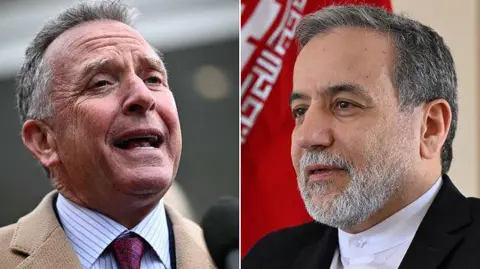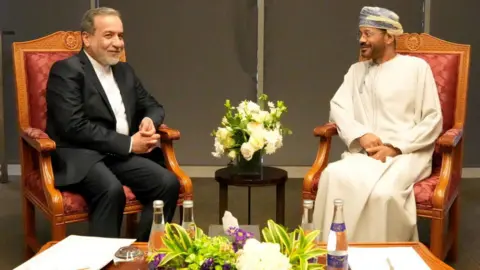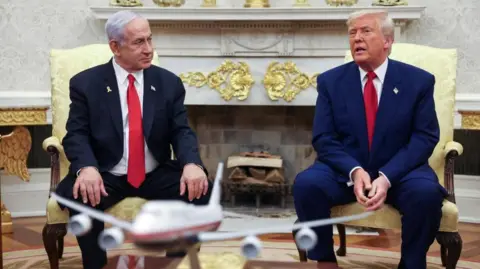US and Iran hold 'constructive' first round of nuclear talks
 Getty Images
Getty ImagesIran and the US have concluded a first round of talks in Oman over Tehran's nuclear programme - the highest-level meeting between the two nations since 2018.
Both countries described the meeting as "constructive" and confirmed a second round of discussions will take place next week - with the US hailing the "direct communication" as being key to striking a possible deal.
President Donald Trump pulled the US out of a previous nuclear agreement between Iran and world powers in 2018, and has long said he would make a "better" deal.
The talks are seen as an important first step in establishing whether a deal can be done.
At two-and-a-half hours, the first meeting was brief, reportedly respectful - and set the stage for a second round.
That was probably as good as it could get when Iranian and US officials sat down in Muscat, the capital of Oman - whose top diplomat mediated the primarily indirect negotiations.
They were the most significant talks since Trump pulled the US out of the Iran nuclear deal of 2015 during his first term in office.
The verdict of Iran's lead negotiator, Foreign Minister Abbas Araghchi, was positive.
"In my opinion, as the first meeting, it was a constructive meeting held in a very peaceful and respectful environment, because no inappropriate language was used," he told Iranian state TV.
His diplomatic tone suggests the US team led by Trump's envoy Steve Witkoff did not reiterate some of the president's threats that Iran would face "great danger" if this dialogue did not succeed. He has repeatedly warned of possible military strikes.
This meeting ran with the delegations in separate rooms, relaying messages through Oman's foreign minister, Badr bin Hamad al-Busaidi.
Witkoff, who is leading the US delegation, had previously only spoken of meeting face-to-face.
But Araghchi and Witkoff did speak for a few minutes in the presence of Busaidi – not the direct talks US officials said would happen but what could be a small but significant opening.
Iran, mindful of pressure from hardliners at home, underlined how limited their face-to-face exchange was, with no photographs taken.
In a statement following the talks, the White House said the discussions "were very positive and constructive", noting that Witkoff had emphasised to Iran that he had instructions to resolve the adversaries' "differences through dialogue and diplomacy, if that is possible".
"These issues are very complicated, and special envoy Witkoff's direct communication today was a step forward in achieving a mutually beneficial outcome," the statement added.
Araghchi had said ahead of the discussions that his country wanted a "fair agreement".
After the talks concluded, he said discussions next week may not happen in Oman, but would still be mediated by the Middle Eastern nation. The White House said they would take place next Saturday.
"Neither we, nor the other party, want fruitless negotiations, discussions for discussions' sake, time wasting or talks that drag on forever," Araghchi told Iranian state television.
 Reuters
ReutersThe most important issue at stake is what kind of deal each side would be willing to accept.
Trump sent a letter to Iran's supreme leader via the United Arab Emirates last month, saying he wanted a deal to prevent Iran from acquiring nuclear weapons and to avert possible military strikes by the US and Israel.
Iran hopes for a deal to limit, but not dismantle, its nuclear programme in exchange for sanctions relief.
An unnamed source in Oman told news agency Reuters that the talks would seek to de-escalate regional tensions and secure prisoner exchanges.
Trump revealed the talks would take place during a visit by Benjamin Netanyahu to the White House on Monday. The Israeli prime minister said on Tuesday that both leaders had agreed that Iran "will not have nuclear weapons".
 Reuters
ReutersNetanyahu has called for a "Libya-style deal", referring to the north African nation completely dismantling its weapons programme in an agreement reached with Western powers in 2003. That would be completely unacceptable to Iran.
Iran insists its nuclear activities are entirely peaceful and that it will never seek to develop or acquire nuclear weapons.
Iranian officials have made it clear the negotiations will focus only on its nuclear programme, not its broader defence capability, such as its ballistic missile programme.
Ahead of the talks, Trump said on Friday that he wanted Iran "to be a wonderful, great, happy country - but they can't have nuclear weapons".
Trump has warned that the US would use military force if a deal was not reached, and Iran has repeatedly said it will not negotiate under pressure.
But this process is taking place under immense pressure.
Even as preparations were under way to arrange this first meeting, the US moved more warships and stealth bombers to the region and imposed more sanctions.
- What is Iran's nuclear programme and what does the US want?
- Iran says it is ready for nuclear deal if US stops military threats
The US president told reporters in the Oval Office on Monday it would "be a very bad day for Iran" if the talks were unsuccessful.
Iran insists its nuclear activities are entirely peaceful and that it will never seek to develop or acquire nuclear weapons.
However, since Trump pulled out of the 2015 agreement - which expires later this year - Iran has increasingly breached restrictions imposed by the existing nuclear deal in retaliation for crippling US sanctions reinstated seven years ago, and has stockpiled enough highly-enriched uranium to make several bombs.
Under the terms of the 2015 deal, Iran agreed to only enrich uranium up to 3.67% purity for the next 15 years.
In February, the International Atomic Energy Agency (IAEA) nuclear watchdog reported that Tehran had stockpiled uranium enriched to 60% purity and could swiftly move to 90%, which would be weapons-grade.
The 2015 nuclear deal took nearly two years of intensive negotiations. At the start of this new effort to reach an agreement, Iran's programme is far more developed and complex, and the wider region is far more volatile.
